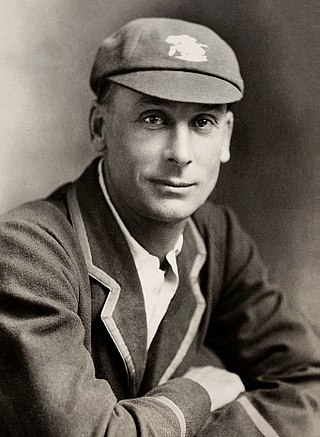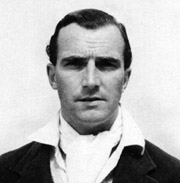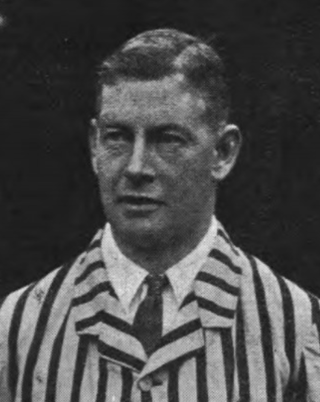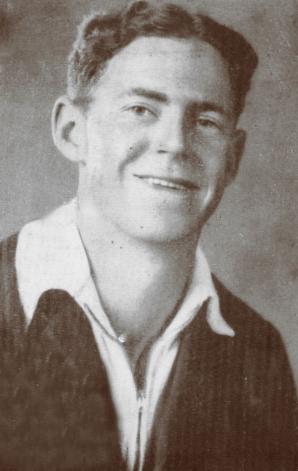
Harold Larwood was a professional cricketer for Nottinghamshire County Cricket Club and the England cricket team between 1924 and 1938. A right-arm fast bowler who combined extreme speeds with great accuracy, he was considered by many players and commentators to be the finest and the fastest fast bowler of his generation and one of the fastest bowlers of all time. He was the main exponent of the bowling style known as "bodyline", the use of which during the Marylebone Cricket Club (MCC) tour of Australia in 1932–33 caused a furore that brought about a premature and acrimonious end to his international career.

Sir John Berry Hobbs was an English professional cricketer who played for Surrey from 1905 to 1934 and for England in 61 Test matches between 1908 and 1930. Known as "The Master", he is widely regarded as one of the greatest batsmen in the history of cricket. He is the leading run-scorer and century-maker in first-class cricket, with 61,760 runs and 199 centuries. A right-handed batsman and an occasional right-arm medium pace bowler, Hobbs also excelled as a fielder, particularly in the position of cover point. Hobbs was named as one of the five Wisden Cricketers of the Century alongside Sir Donald Bradman, Sir Garfield Sobers, Shane Warne, and Sir Viv Richards.
Greville Thomas Scott Stevens was an English amateur cricketer who played for Middlesex, the University of Oxford and England. A leg-spin and googly bowler and attacking batsman, he captained England in one Test match, in South Africa in 1927. He was widely regarded as one of the leading amateur cricketers of his generation who, because of his commitments outside cricket, was unable to fulfil his potential and left the game early.

Arthur Percy Frank Chapman was an English cricketer who captained the England cricket team between 1926 and 1931. A left-handed batsman, he played 26 Test matches for England, captaining the side in 17 of those games. Chapman was appointed captain for the final, decisive Test of the 1926 series against Australia; under his captaincy, England defeated Australia to win the Ashes for the first time since 1912. An amateur cricketer, Chapman played Minor Counties cricket for Berkshire and first-class cricket for Cambridge University and Kent. Never a reliable batsman, Chapman nevertheless had a respectable batting record. He could score runs very quickly and was popular with spectators. As a fielder, contemporaries rated him extremely highly. Although opinions were divided on his tactical ability as a captain, most critics accepted he was an inspirational leader.
Donald Bryce Carr OBE was an English cricketer who played for Derbyshire from 1946 to 1967, for Oxford University from 1948 to 1951, and twice for England in 1951/52. He captained Derbyshire between 1955 and 1962 and scored over 10,000 runs for the county.
Nigel David Howard was an English cricketer, who played for Lancashire and England. Born in Gee Cross, Hyde, Cheshire, he captained England on the tour to India in 1951–52. In the only four Test matches he played in, England won one and drew three, although the series was tied after the Fifth Test was lost. Howard was chosen to lead the side to the sub-continent largely because he was the best available amateur and a successful leader of Lancashire (1949–53).

Kenneth Cranston was an English amateur cricketer, who played first-class cricket for Lancashire and eight times for England, in 1947 and 1948. He retired from playing cricket to concentrate on his career as a dentist.

Douglas Ward Carr was an English amateur cricketer who played once for the England cricket team in 1909. Carr only began playing first-class cricket in 1909 aged 37 for Kent County Cricket Club. A leg-break bowler who was one of the early proponents of the new googly delivery, he shot to fame in 1909 and enjoyed a short career in the years before the First World War. He was named one of Wisden's five Cricketers of the Year in 1910.

Ronald Arthur Saggers was an Australian cricketer who played for New South Wales. He played briefly for the Australian team, playing six Tests between 1948 and 1950. In his Test cricket career he made 24 dismissals and scored 30 runs at an average of 10.00.

Ronald Arthur Hamence was a cricketer who played for South Australia and Australia. A short and compact right-handed batsman, Hamence excelled in getting forward to drive and had an array of attractive back foot strokes. Already the youngest Australian to play district cricket, he was also, from the death of Bill Brown in 2008 until his own death in 2010, the oldest surviving Australian Test cricketer.
1909 was the 20th season of County Championship cricket in England and featured a Test series between England and Australia. Kent won the championship and Australia, captained by Monty Noble, won the Test series.
Darren John Pattinson is an English former cricketer who played for Victoria and Nottinghamshire. Pattinson received considerable press coverage when he was surprisingly selected for the England cricket team in July 2008 for the 2nd Test against South Africa at Headingley. Former England captain Graham Gooch described his selection as "one of the most leftfield decisions I've ever seen".
Ronald Ernest Bird (4 April 1915 – 20 February 1985) was an English cricketer who played 195 first-class matches in the years after the Second World War. 190 of these were for Worcestershire, while the other five were for Marylebone Cricket Club (MCC). He captained Worcestershire between 1952 and 1954, though he had acted as such on many occasions during the previous two seasons when official captain Bob Wyatt was unavailable. He usually batted at number four, while his fast-medium bowling was of the occasional variety: he never took a season's tally of wickets into double figures.
Ronald Cecil Graham Joy was an English cricketer. A right-handed batsman and right-arm fast-medium bowler, he played for Essex between 1922 and 1928. His father-in-law Frank Penn played Test cricket for England in 1880.
Edwin Emerson Rodwell, MM was an Australian soldier, cricket player, umpire, commentator and administrator. He fought in World War II, in New Guinea, and Borneo, and was awarded the Military Medal. Rodwell was an opening batsman and a prolific run-scorer at club level, and represented Tasmania on 15 occasions at first-class level, captaining the side five times between 1950 and 1951 and 1955–56. He also played three times for a first-class "Tasmania Combined XI". During his captaincy Tasmania won their first first-class match after a winless period of over 20 years, making him the first successful Tasmanian captain since Jim Atkinson in the early 1930s.

Ronald Orlando George Morrisby, was an Australian cricketer who played first-class cricket for Tasmania from 1931 until 1952. He can be considered one of the most outstanding Tasmanian batsman of his era, and was unlucky never to be selected to play test cricket for Australia, despite having toured India with an Australian side. Morrisby was the 29th player to captain the Tasmanian first-class team, but was never able to lead them to victory. An exciting batsman with a preference for playing off the back foot, he played for South Hobart Cricket Club in the Tasmanian Grade Cricket competition, and still holds many records in that competition, including being the all-time leading run scorer.
John Ronald Dale was an English school teacher and cricketer. He was born in Cleethorpes in Lincolnshire in 1930 and played primarily for Lincolnshire County Cricket Club.
Kent County Cricket Club's 1909 season was the twentieth season in which the county club competed in the County Championship. Kent played 30 first-class cricket matches during the season, losing only two matches overall, and won their second championship title. They finished clearly ahead of second place Lancashire in the 1909 County Championship with the previous year's winners, Yorkshire, in third place.
Kent County Cricket Club's 1910 season was the 21st season in which the County competed in the County Championship. Kent played 29 first-class cricket matches during the season, losing only five matches overall, and won their third Championship title. They finished well ahead of second place Surrey in the 1910 County Championship.
Ronald Stanley Thresher, known as Ron Thresher, was an English cricketer who played five first-class cricket matches between 1957 and 1958.







